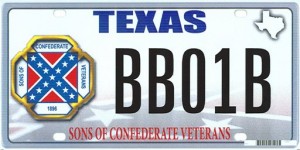US justices struggle with free speech case over license plates
By: Associated Press//March 23, 2015//
US justices struggle with free speech case over license plates
By: Associated Press//March 23, 2015//
By MARK SHERMAN
Associated Press

WASHINGTON (AP) — The U.S. Supreme Court struggled Monday in a dispute over a proposed Confederate battle flag license plate to balance worries about government censorship and concerns that offensive messages could, at worst, incite violence.
Nearly 150 years after the end of the Civil War, the justices heard arguments in a case over Texas’ refusal to issue a license plate bearing the battle flag. Nine other states allow drivers to display plates with the flag, which remains both a potent image of heritage and a racially charged symbol of repression.
Specialty license plates are big business in Texas. They brought in $17.6 million in Texas last year and state officials said there are now nearly 450 messages to choose from.
The state rarely rejects a specialty plate, but it did turn down a request by the Texas division of the Sons of Confederate Veterans for a license plate with its logo bearing the battle flag. The group’s lawsuit led to Monday’s hearing.
The justices seemed uncomfortable with arguments advanced by the state in defense of its actions and the Sons of Confederate Veterans.
If the court finds the state must permit the battle flag on license plates, several justices wanted to know if a swastika, a racial slur and a call for jihad would be allowed if someone requested them.
Yes, lawyer R. James George Jr. said on behalf of the veterans group. “I just don’t think the government can discriminate based on content,” said George, who served as a law clerk to Supreme Court Justice Thurgood Marshall 45 years ago.
The result of such a ruling, Justice Anthony Kennedy said, probably would end the state’s program of allowing many specialized license plates. “If you prevail, it’s going to prevent a lot of Texans from conveying a message,” Kennedy said.
More skeptical about the state’s argument, Chief Justice John Roberts and Justice Samuel Alito said the sheer number of messages and their wide range show that the state’s only interest is money.
“They’re only doing this to get the money,” Roberts said. “Texas will put its name on anything.”
Texas Solicitor General Scott Keller said the state makes the plates and owns them. “Texas has its name on every license plate,” Keller said.
Car owners remain free to express any message they wish by attaching bumper stickers or painting their cars, he said.
Texas commemorates the Confederacy in many ways. The battle flag is etched on a century-old Civil War monument on the grounds of the state Capitol in Austin.
The First Amendment dispute has brought together some unlikely allies, including the American Civil Liberties Union, anti-abortion groups, Americans United for Separation of Church and State, civil libertarian Nat Hentoff and conservative satirist P.J. O’Rourke.
“In a free society, offensive speech should not just be tolerated, its regular presence should be celebrated as a symbol of democratic health — however odorous the products of a democracy may be,” Hentoff, O’Rourke and others said in a brief backing the group.
The case could be important for how the Supreme Court determines whether the speech at issue belongs to private individuals or the government.
Eleven states are supporting Texas because they fear that a ruling against the state would call into question license plates that promote national and state pride and specific positions on such controversial issues as abortion.
A decision in Walker v. Sons of Confederate Veterans, 14-144, is expected by late June. Follow @shermancourt
Legal News
- Gov. Evers seeks applicants for Dane County Circuit Court
- Milwaukee man charged in dismemberment death pleads not guilty
- Democratic-led states lead ban on the book ban
- UW Madison Professor: America’s child care crisis is holding back moms without college degrees
- History made in Trump New York trial opening statements
- Prosecutor won’t bring charges against Wisconsin lawmaker over fundraising scheme
- Republican Wisconsin Senate candidate says he doesn’t oppose elderly people voting
- Vice President Harris to reveal final rules mandating minimum standards for nursing home staffing
- Election workers fear threats to their safety as November nears
- Former law enforcement praise state’s response brief in Steven Avery case
- Eric Toney announces re-election bid for Fond du Lac County District Attorney
- Former Wisconsin Democratic Rep. Peter Barca announces new bid for Congress
WLJ People
- Power 30 Personal Injury Attorneys – Russell Nicolet
- Power 30 Personal Injury Attorneys – Benjamin Nicolet
- Power 30 Personal Injury Attorneys – Dustin T. Woehl
- Power 30 Personal Injury Attorneys – Katherine Metzger
- Power 30 Personal Injury Attorneys – Joseph Ryan
- Power 30 Personal Injury Attorneys – James M. Ryan
- Power 30 Personal Injury Attorneys – Dana Wachs
- Power 30 Personal Injury Attorneys – Mark L. Thomsen
- Power 30 Personal Injury Attorneys – Matthew Lein
- Power 30 Personal Injury Attorneys – Jeffrey A. Pitman
- Power 30 Personal Injury Attorneys – William Pemberton
- Power 30 Personal Injury Attorneys – Howard S. Sicula











